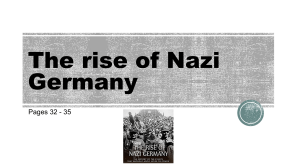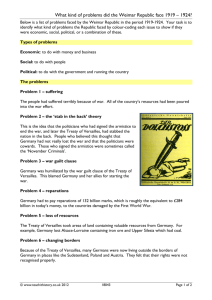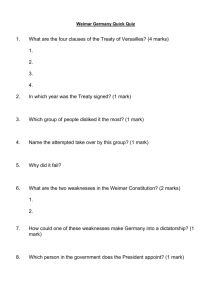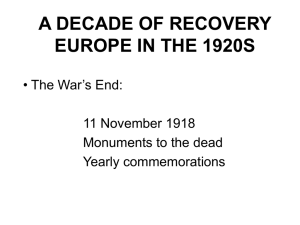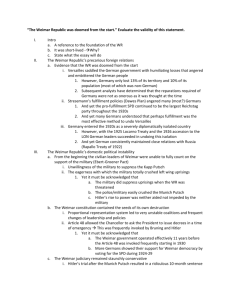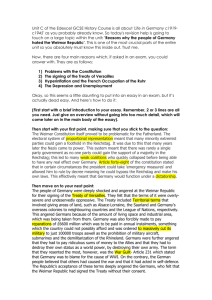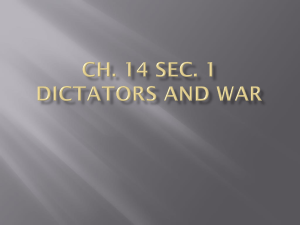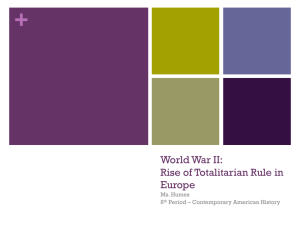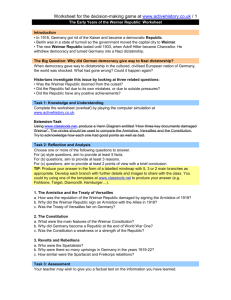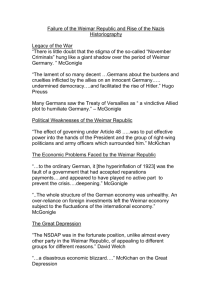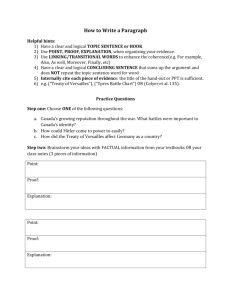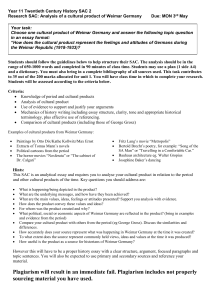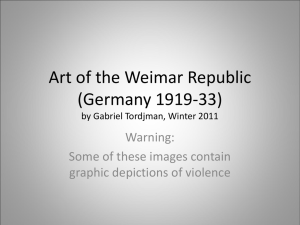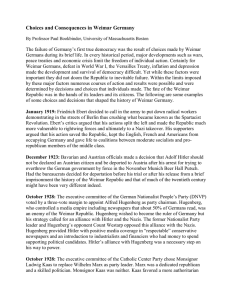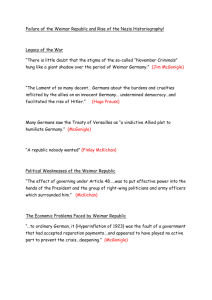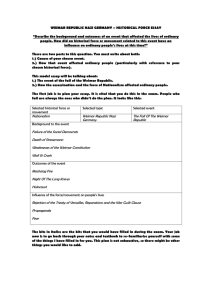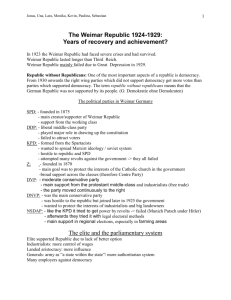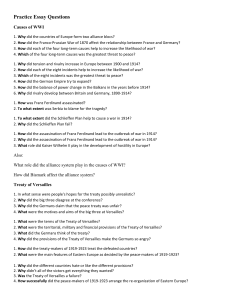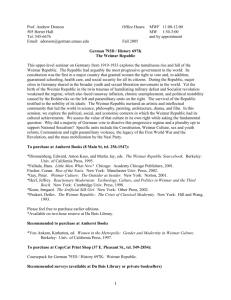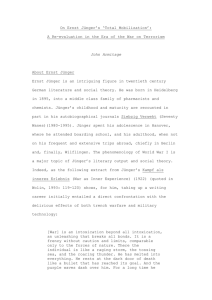HI 224
advertisement
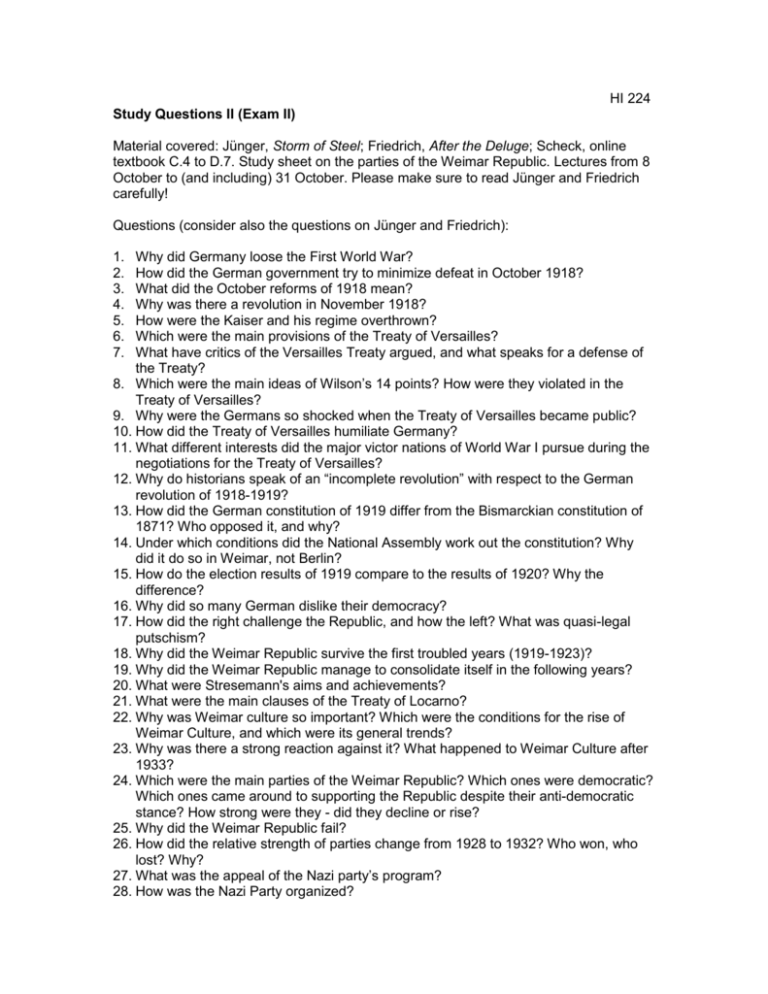
HI 224 Study Questions II (Exam II) Material covered: Jünger, Storm of Steel; Friedrich, After the Deluge; Scheck, online textbook C.4 to D.7. Study sheet on the parties of the Weimar Republic. Lectures from 8 October to (and including) 31 October. Please make sure to read Jünger and Friedrich carefully! Questions (consider also the questions on Jünger and Friedrich): 1. 2. 3. 4. 5. 6. 7. Why did Germany loose the First World War? How did the German government try to minimize defeat in October 1918? What did the October reforms of 1918 mean? Why was there a revolution in November 1918? How were the Kaiser and his regime overthrown? Which were the main provisions of the Treaty of Versailles? What have critics of the Versailles Treaty argued, and what speaks for a defense of the Treaty? 8. Which were the main ideas of Wilson’s 14 points? How were they violated in the Treaty of Versailles? 9. Why were the Germans so shocked when the Treaty of Versailles became public? 10. How did the Treaty of Versailles humiliate Germany? 11. What different interests did the major victor nations of World War I pursue during the negotiations for the Treaty of Versailles? 12. Why do historians speak of an “incomplete revolution” with respect to the German revolution of 1918-1919? 13. How did the German constitution of 1919 differ from the Bismarckian constitution of 1871? Who opposed it, and why? 14. Under which conditions did the National Assembly work out the constitution? Why did it do so in Weimar, not Berlin? 15. How do the election results of 1919 compare to the results of 1920? Why the difference? 16. Why did so many German dislike their democracy? 17. How did the right challenge the Republic, and how the left? What was quasi-legal putschism? 18. Why did the Weimar Republic survive the first troubled years (1919-1923)? 19. Why did the Weimar Republic manage to consolidate itself in the following years? 20. What were Stresemann's aims and achievements? 21. What were the main clauses of the Treaty of Locarno? 22. Why was Weimar culture so important? Which were the conditions for the rise of Weimar Culture, and which were its general trends? 23. Why was there a strong reaction against it? What happened to Weimar Culture after 1933? 24. Which were the main parties of the Weimar Republic? Which ones were democratic? Which ones came around to supporting the Republic despite their anti-democratic stance? How strong were they - did they decline or rise? 25. Why did the Weimar Republic fail? 26. How did the relative strength of parties change from 1928 to 1932? Who won, who lost? Why? 27. What was the appeal of the Nazi party’s program? 28. How was the Nazi Party organized? 29. Why did the Communist Party become stronger? To whom did they appeal? What was the effect of the KPD’s growth on non-Communists? 30. Which were the conditions for the growth of political radicalism in 1930-32? 31. Why was the “grand coaliton” under SPD leadership overthrown in 1930? 32. Which were Brüning’s economic and political aims? 33. Who voted for the Nazis? Which parties lost most of their voters to the NSDAP? 34. Why did people vote for Hitler and the NSDAP in 1930-32? 35. Which were the aims of Papen and Schleicher? Why did they fail as chancellors? 36. How did Papen overcome Hindenburg’s reluctance to appoint Hitler as chancellor? What were the main points of his “taming strategy”? 37. Why did the Hitler cabinet at first appeal to Hitler’s conservative allies? 38. Why did Papen’s taming strategy fail? Good luck! Please contact me with any question you might have!
